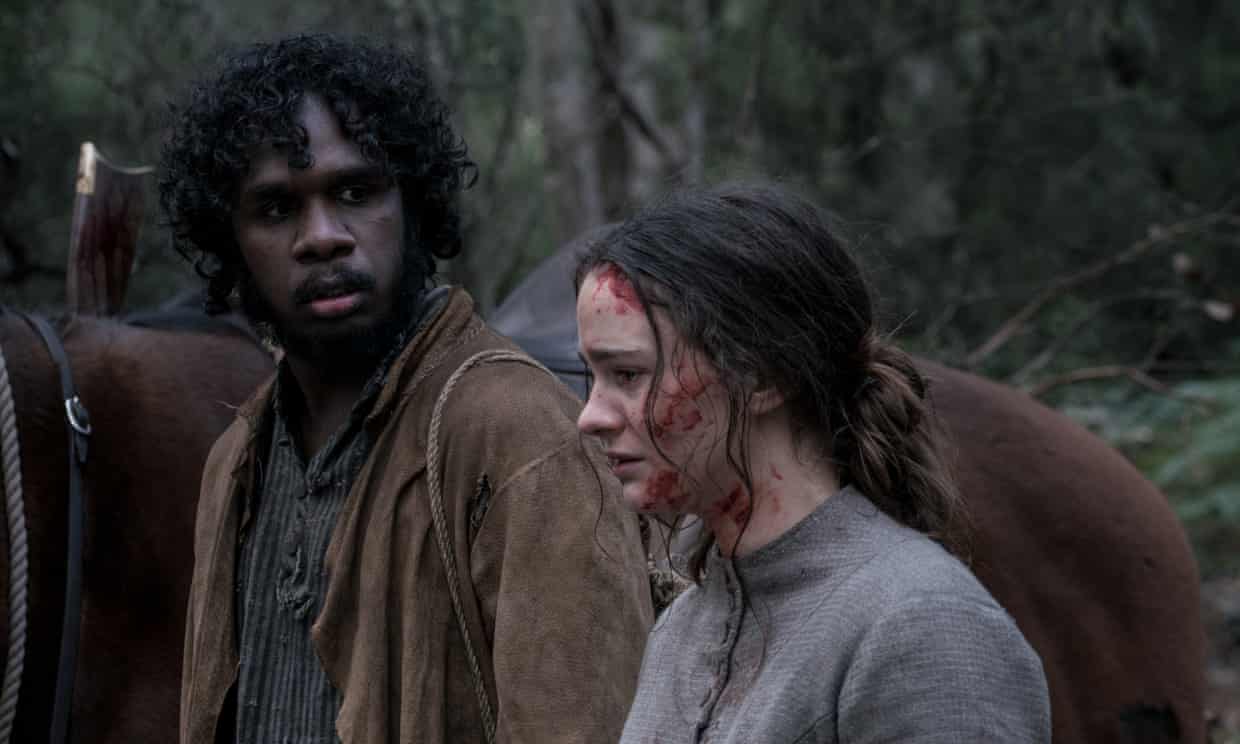
An ugly truth: is cinema finally facing up to Britain's colonial past?
by Steve RoseThe Nightingale is a rare attempt to depict the brutal reality of British imperial rule. The industry must do more to tell it like it was
Jennifer Kent’s new thriller The Nightingale is a tough watch. The setting is lawless, early 19th-century Tasmania, and the opening half hour, especially, is a catalogue of violence: rape, murder, beatings, senseless slaughter, even ecological violence. The victims are chiefly women and indigenous people; the principal perpetrators are uniformed British soldiers. The Nightingale reminds us that Britain’s colonisation of Australia involved the killing of tens of thousands of Indigenous Australians, with at least 270 documented massacres and many more untold tales of cruelty. The film’s violence prompted walkouts when it screened in Sydney earlier this year, but Kent has maintained that it is historically accurate. “I couldn’t go into this part of our history and water it down,” she said. “Like many other countries that have been colonised, the indigenous people of Australia were subject to horrendous treatment by the colonisers. The systems of power were brutal, and I wanted The Nightingale to reflect this.”
When we look back over British cinema and British colonial violence, there has been an awful lot of watering down going on. Australian is just one pink-coloured corner of the imperial map. Swathes of Asia, Africa and America suffered similar levels of British brutality, from the East Bengal famine to the Boer war concentration camps to the suppression of the Mau Mau uprising in Kenya; but you would never get that impression from our movies. When it comes to historical drama, we would rather dwell on domestic matters: courtship, class, costumes, country houses or city squalor, with some allusion to a far-off war at best. The Nightingale is set in 1825, so somewhere between Jane Austen and Charles Dickens, but it feels like a different planet.
It is not a planet most Britons recognise. According to a 2014 YouGov survey, 59% of us feel the empire was “something to be proud of”, rather than ashamed of. Our politicians concur. Visiting the Indian city of Amritsar, scene of the 1919 infamous massacre, the prime minister David Cameron stated in 2013: “I think there’s an enormous amount to be proud of in what the British empire did and was responsible for.” And commenting on Britain’s legacy in Africa in the Spectator in 2002, Boris Johnson wrote: “The continent may be a blot, but it is not a blot upon our conscience. The problem is not that we were once in charge, but that we are not in charge any more.”
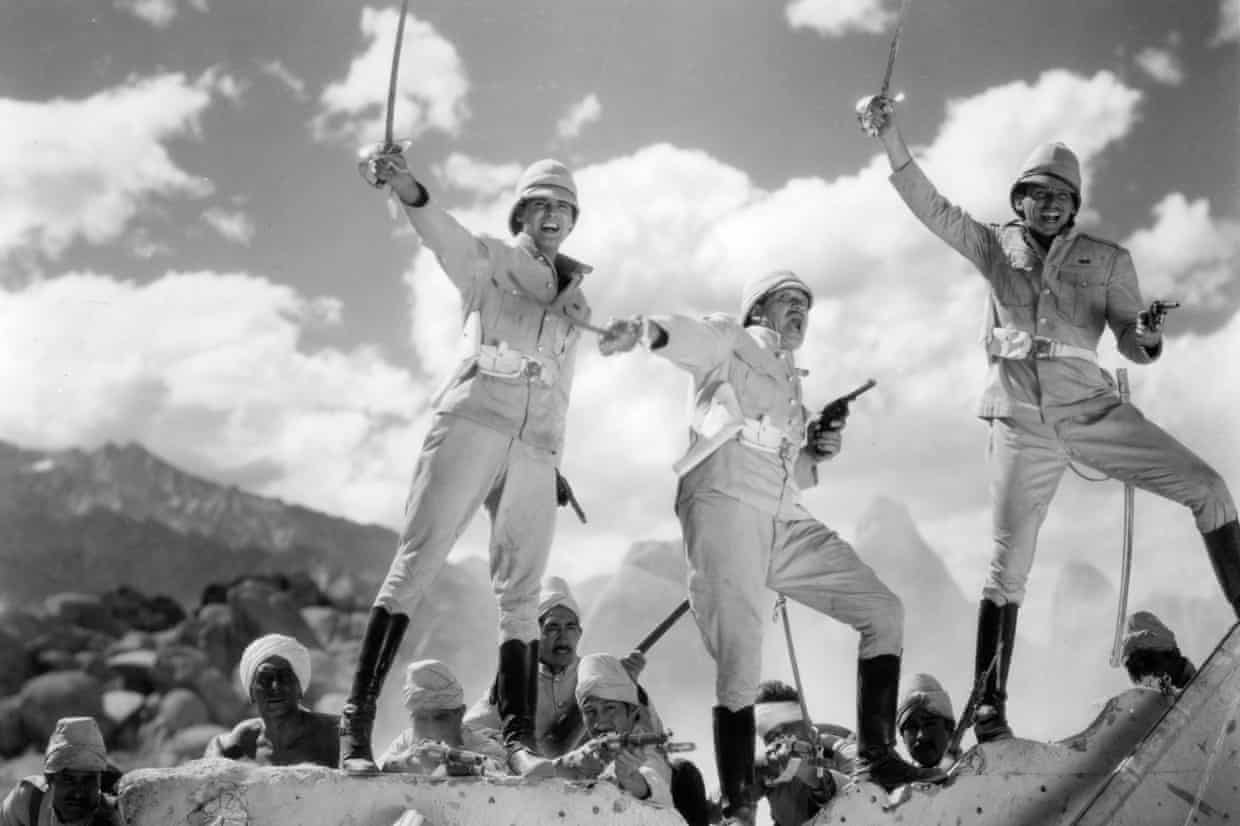
Perhaps Johnson was thinking back to Rudyard “White Man’s Burden” Kipling, whose lines from another poem, The Road to Mandalay, he inappropriately recited at a temple in Myanmar two years ago (until the mortified British ambassador cut him off). Or perhaps Johnson was thinking of crusty old movies such as 1935’s Sanders of the River, directed by Zoltan Korda, in which the paternalistic British commissioner in Nigeria keeps the primitive tribes “civilised” – including the great Paul Robeson, who literally bows at Sanders’ feet, wearing a loincloth. The film is dedicated to the “handful of white men whose everyday work is an unsung saga of courage and efficiency”, a title card announces – even as it sings these praises very loudly. Robeson later disowned the film, furious that he had been co-opted into what became a piece of imperialist propaganda.
There was a time when the movies were only too happy to depict British colonial violence, just not in a negative way. In the mid 20th century, tales of colonial adventurism were seized upon, usually with an eye for Boys’ Own action spectacle rather than historical instruction. The same year that Britain put out Sanders of the River, Hollywood released The Lives of a Bengal Lancer, loosely based on the memoirs of a real British soldier, but retooled as a tale of white heroism starring Gary Cooper. The movie’s success sparked a run of similar stories through the 1930s: Korda’s The Four Feathers, Clive of India, The Charge of the Light Brigade, Storm Over Bengal, and, in 1939, Gunga Din, inspired by Kipling’s poem, with Cary Grant and Douglas Fairbanks Jr jauntily thwarting a Thuggee uprising in 1880s India.
These movies were enthusiastically, unquestioningly pro-British. They were also casually racist, with hostile natives slaughtered in droves, ethnic stereotyping and, often, actors in blackface (Gunga Din was played by the Jewish actor Sam Jaffe; the Canadian actor Douglass Dumbrille played the torturing Muslim in Bengal Lancer). “England need have no fears for its empire so long as Hollywood insists upon being the Kipling of the Pacific,” said the New York Times’ review of Lives of a Bengal Lancer. Disturbingly, Bengal Lancer’s many fans included Adolf Hitler, who thought the film set an example of “how a superior race must behave”, and made it compulsory viewing for SS officers.
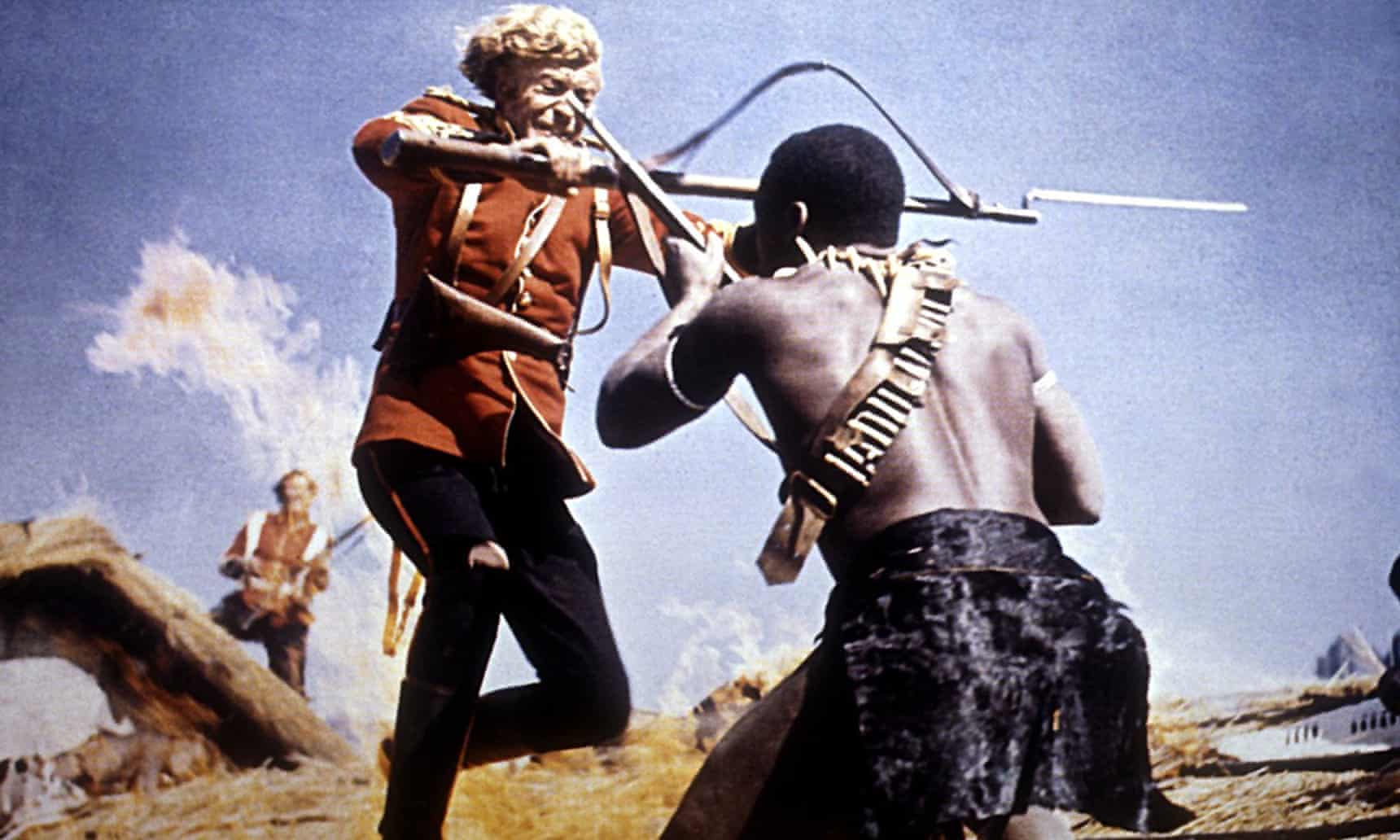
After the second world war, though, the tales of imperial valour and carnage became even more epic. The convention of blackface also prevailed, with Oliver Reed in The Brigand of Kandahar (1965); Laurence Olivier in Khartoum (1966) and Alec Guinness in Lawrence of Arabia (1962). Lawrence is possibly the high point of white-saviour colonial cinema, but peak imperial carnage must be Zulu: still widely regarded as a classic, but a deeply problematic one. In a fictionalised scene, the surviving Zulus return after their defeat to pay tribute to the British, as if to acknowledge the fairness of the fight and, by extension, the colonial project. Either way, the film concludes with the stark contrast of well-armed, red-uniformed ranks of British soldiers on one side of the frame, and a pile of black, half-naked bodies on the other. This was imperialism red in tooth and claw and not a pretty sight.
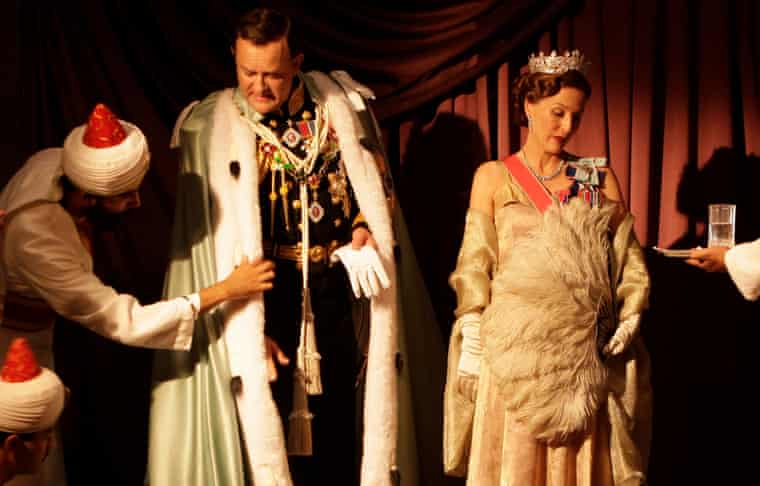
When cinema does broach the subject of colonialism these days, it is often through a prism of respectability and revisionism. An example would be 2017’s Viceroy’s House, by the British-Indian film-maker Gurinder Chadha, chronicling the 1947 partition of India and Pakistan. Even as it ended nearly 200 years of British oppression, partition led to the deaths of between one and two million people and the displacement of 15 million on the Indian subcontinent. But, as the title suggests, Viceroy’s House spends most of its time indoors, charting political wrangling and upstairs-downstairs shenanigans in the lavish household of Lord Mountbatten (played by Hugh Bonneville for Downtonesque resonance). In this paper, the writer Fatima Bhutto called the film a “servile pantomime of partition”. The Mountbattens are portrayed as kindly, peace-loving aristocrats, who are terribly upset to learn of the violence going on outside, but bear little responsibility for it. The disastrous partition strategy is largely blamed on Winston Churchill, a move dubbed by some as “fake history”. Despite Chadha’s personal connection to the story, it comes off as another attempt to put a gloss on British imperialism. “Do you think you Indians are ready to run your own civil service, courts of law, your own armed forces?” a British official asks an Indian servant. “We’ve learned from the best, sir,” he replies.
The Raj has been a perennial theme for British film and television, but not the violent bits, thank you. Usually, it is exotic romances such as The Far Pavilions or Merchant-Ivory’s Heat and Dust, or David Lean’s A Passage to India, which picked at political and cultural tensions at the local level (with Alec Guinness in “brownface” again in the latter). A possible exception was Gandhi, which, as well as taking the Indians’ point of view, bravely restaged the 1919 Amritsar massacre. Indian cinema has created plenty of its own, considerably less flattering, takes on the Raj, from nuanced critiques such as Satyajit Ray’s The Chess Players to big-budget portrayals of anti-British heroes such as Bhagat Singh and Mangal Pandey, not to mention last year’s epic Thugs of Hindostan, starring Aamir Khan and Amitabh Bachchan. Khan also led the 2001 hit Lagaan, in which lowly villagers resist their Raj oppressors through the medium of cricket – an altogether more palatable form of revolt.
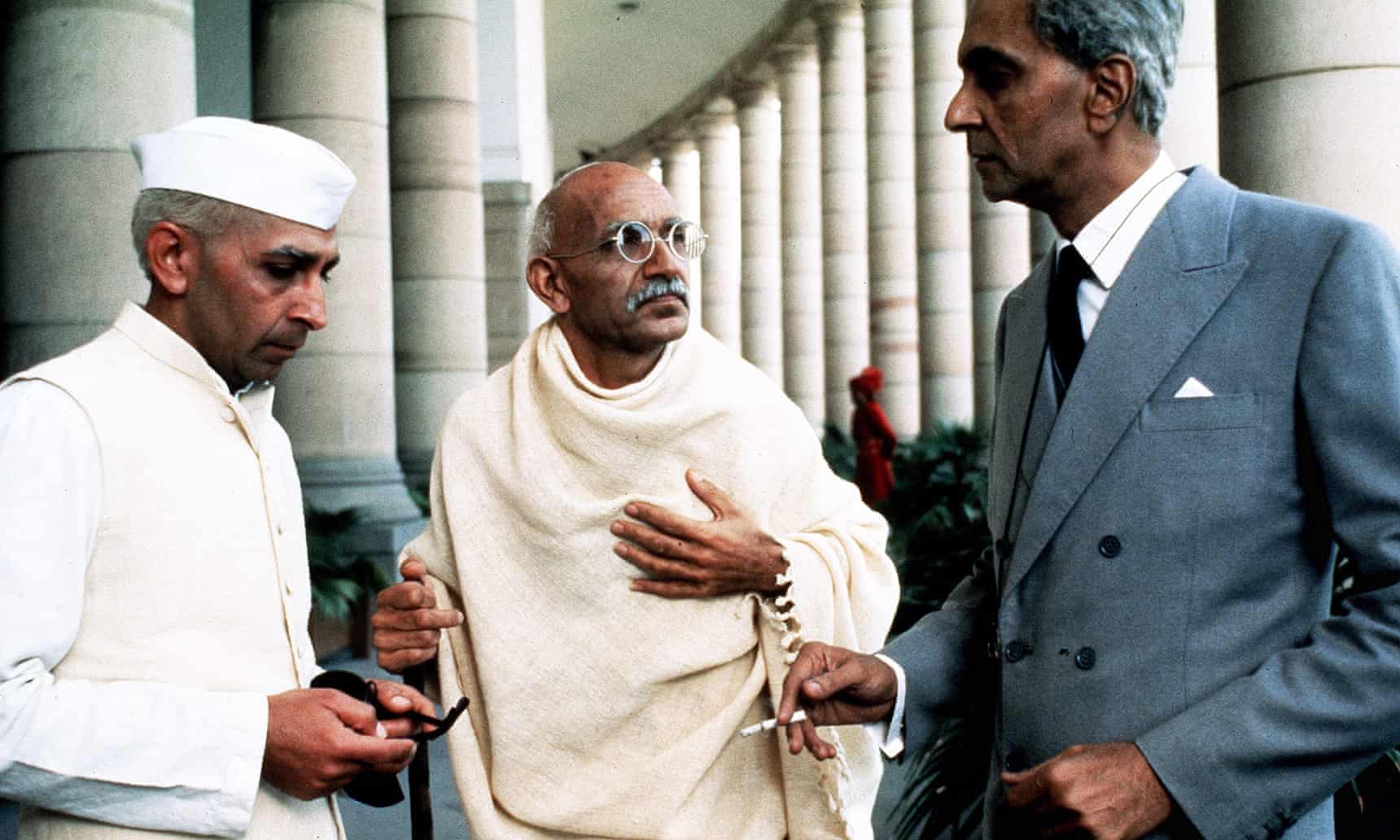
Australia and New Zealand have always been well-positioned to comment on British colonialism, being possessed of both world-class, English-language film-makers and a less than rose-tinted view of its own history. The Nightingale follows in the footsteps of movies such as Bruce Beresford’s Breaker Morant (about three Australians stitched up for war crimes in the Boer war), Peter Weir’s Gallipoli, Rabbit Proof Fence (on Indigenous Australian child-separation in the 1930s), or savage, outback westerns such as The Proposition, Sweet Country and Justin Kurzel’s forthcoming True History of the Kelly Gang. Not to mention New Zealand’s Utu (Māori warrior turns against the Brits) or River Queen (Samantha Morton caught up in colonial warfare).
But the fact that a movie like The Nightingale should be so rare, and the true violence it details so shocking, underlines just how much power Britain still wields. Our military might has long since waned but in cultural terms, Britain remains a colonial superpower. Thanks to the size of our film industry, our close ties with Hollywood and the predominance of our language, it is still British stories and perspectives that dominate the cultural landscape. With that power comes a responsibility to tell it like it was. You could even call it a “burden”. But if we can’t be honest about our violent history, we should pay attention to those who can.